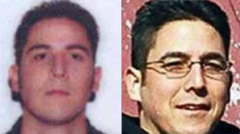How Did One of America's Most Wanted Escape the FBI for 21 Years Only to Be Caught in Wales?

Published: 2025-09-06 21:05:06 | Category: wales
Daniel Andreas San Diego, a suspected double bomber on the FBI's most wanted list, is facing extradition to the United States after evading capture for 21 years. He is accused of carrying out bombings linked to animal rights extremist groups in the San Francisco Bay Area in 2003, and is currently in custody in the UK, where a court will decide on his extradition this week.
Last updated: 12 October 2023 (BST)
Key Takeaways
- Daniel San Diego is wanted for two bombings in the San Francisco Bay Area in 2003.
- He was arrested in North Wales in 2024 after 21 years on the run.
- The FBI believes he has connections to animal rights extremist groups.
- San Diego's extradition hearing will determine if he will be sent back to the US.
- Former FBI agents expressed frustration over missed opportunities to capture him earlier.
The Background of the Case
In August and September 2003, two bombings occurred in the San Francisco Bay Area, targeting companies associated with animal testing. These attacks were claimed by the animal rights extremist group Revolutionary Cells - Animal Liberation Brigade. Daniel San Diego became the prime suspect shortly after the bombings due to his alleged connections with these groups and his background as a computer network specialist.
Initial Investigations and Missed Opportunities
Investigators initially believed they had sufficient evidence to arrest San Diego before he vanished. Former FBI agents have since commented on the "missed opportunities" that allowed him to evade capture. David Smith, a former FBI special agent involved in the case, recalled that San Diego was not on their radar as a violent individual, which might have contributed to the delay in apprehending him.
The Bombings: A Closer Look
The first bombing took place on 28 August 2003 at a biotech firm in Emeryville, near Oakland, California. The second attack occurred on 26 September 2003 at a nutritional products company in Pleasanton, approximately 30 miles (48 km) away. Fortunately, no one was injured in either incident, although there were concerns about the second bomb being designed to target first responders.
Details of the Chase
On the day San Diego went off the FBI's radar, he was under surveillance. However, after a frantic drive through rush-hour traffic, he managed to evade capture. Agents described a chaotic chase that encompassed the San Francisco area, ultimately ending with San Diego abandoning his vehicle in the city centre. Despite the FBI's extensive resources, including surveillance planes, they lost sight of him amid the fog that is characteristic of San Francisco.
Life on the Run
Post-2003, the FBI continued to track leads and maintain surveillance on San Diego's family and friends. They believed he had fled to central or South America, making it increasingly difficult to locate him. For years, the case went cold, with San Diego remaining one of the FBI's most wanted fugitives.
Discovery in North Wales
In November 2024, a breakthrough occurred when law enforcement in the UK arrested San Diego in a cottage in North Wales. He was using the alias Danny Webb and was reportedly living in isolation. The National Crime Agency (NCA) and counter-terror police conducted the arrest, bringing an end to San Diego's long-standing evasion of justice.
The Extradition Hearing
Currently, San Diego is being held at Belmarsh Prison, a high-security facility in London, as his extradition hearing approaches. This hearing is crucial as it will determine whether he will be sent back to the United States to answer the charges against him. The FBI has expressed their commitment to pursuing justice, demonstrating that they will continue to seek out fugitives no matter how much time has passed.
Implications of the Case
The outcome of this case could be significant not only for the victims of the bombings but also for the broader implications regarding domestic terrorism and animal rights extremism. The FBI’s handling of the case raises questions about decision-making processes in law enforcement and the challenges faced in apprehending fugitives.
What Happens Next?
As the extradition hearing unfolds, the focus will be on the evidence the US has against San Diego and whether it meets the legal standards required for extradition from the UK. Should he be extradited, it could lead to a high-profile trial that revisits the events of 2003 and examines the motivations behind the bombings.
Conclusion
The case of Daniel Andreas San Diego serves as a reminder of the complexities involved in combating domestic terrorism and the challenges law enforcement faces in tracking suspects over long periods. As his extradition hearing approaches, many are left pondering the implications of his actions and the effectiveness of the systems in place to bring him to justice.
Will the legal system ensure that justice is served, or will this case leave lingering questions? #DanielSanDiego #FBI #DomesticTerrorism
FAQs
What charges does Daniel San Diego face?
Daniel San Diego faces charges of maliciously damaging and destroying property using explosives, linked to two bombings in the San Francisco Bay Area in 2003.
Why did it take so long to capture Daniel San Diego?
After the initial bombings, the FBI had intelligence indicating San Diego was a suspect but chose to gather more information before making an arrest, which led to him disappearing for over two decades.
Where was Daniel San Diego found?
San Diego was found in a cottage in North Wales, where he had been living under the alias Danny Webb when he was arrested in November 2024.
What will happen during the extradition hearing?
The extradition hearing will determine if the UK will send San Diego back to the United States to face the charges against him. The US must present sufficient evidence to justify the extradition.
What are the potential consequences if he is extradited?
If extradited, San Diego could face trial in the United States, where he may be held accountable for his actions related to the bombings.



